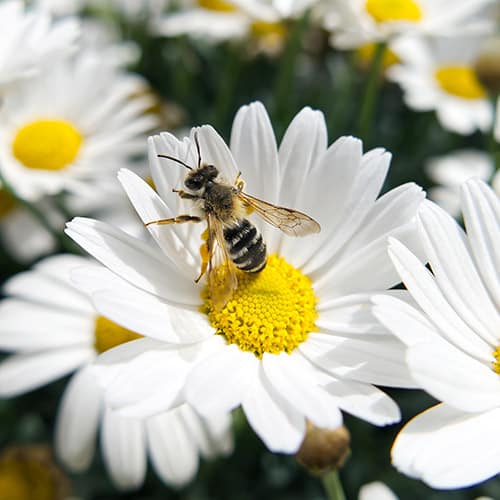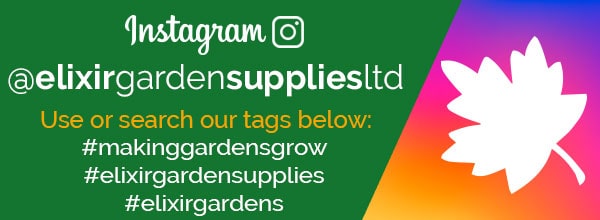How to Attract Pollinators to the Garden
Sarah runs us through how to create a welcoming and nurturing environment for insects & wildlife in your garden or outdoor space. They’ll benefit your flowers and crops as well maintaining a balanced and harmonious eco-system.
Examples of Pollinators
If you are finding your vegetable and fruit plants have failed to produce any crops year after year, the reason may well be that your garden doesn’t attract pollinators. All plants need pollinators to help them to develop seeds and fruits. It’s thought that pollinators help around 80% of plants to reproduce.
Pollinators are beneficial to plants not just because they aid fertilisation but because they encourage more diversity in new plants which helps them to develop better disease and pest resistance as well as the ability to adapt well to a changing climate and growing conditions.
Another great reason to attract pollinators is that many of them (in particular birds, bats, beetles, hoverflies, ladybirds and butterflies) are natural predators to garden pest.
There are over 1,500 pollinating insect species in the UK alone. The most well-known pollinators are a variety of species of bee, including the honeybee, solitary bee and bumblebee.
Although bees are the arguably the hardest working pollinator, other insects help to pollinate plants too. Whilst there are certain plants like brassicas you will want to keep cabbage white butterflies, small white butterflies and cabbage moths away from, other butterflies can be beneficial for pollination.


How to Attract Them
The first place to start is to plant some pollinator friendly plants. Pollinators love Buddleia, Calendula, Cosmos, Lupin, Narsturtium, Poppy, Sunflower and Verbena as well as Wildflowers. If you are growing fruits or vegetables, plant the above around your vegetable and fruit patches to entice pollinators. It is a good idea to deadhead the flowers to promote new flowers so that the pollinators have food into autumn.
Bee friendly wildflower seeds can be sown into Seed Trays to start them off and placed in a shed, greenhouse or cold frame ready to plant up outside when there are no risks of frosts towards the end of the April. Starting off your seeds undercover tends to give you a higher success rate overall.
If you only have a small garden, or not much room, do not fear. You can still attract pollinators. Buy some Decorative Plant Pots and pot young plants such as Rhododendron Ramapo or Percy Wiseman, Sarcoccoca Confusa, Pieris Mountain Fire, Verbena Bonariensis or French Lavender around your space in suitable positions to entice bees and butterflies.
If you wish to attract birds, place bird feeders somewhere safe where the birds won’t be disturbed. Clean them out every couple of weeks then top up the bird seed. For a good all-round feed providing high-energy and low mess, our Wild Bird Food is ideal and comes in a range of weights in a tub or bag.
You may also wish to create an insect hotel for your pollinators. This could be in the form of a bee or bug hotel – which can be made yourself using some wood, a couple of old bricks with air holes, some straw or dried grass cuttings, Bamboo Sticks with an internal diameter between 6mm and 10mm, and some plant pots. Alternatively, you can create a deadwood habitat using some logs or a dead tree trunk with holes drilled out in certain places.
Consider using a slow release fertiliser such as Hoof & Horn, Bone Meal or Calcified Seaweed, or even Chicken Manure. Not only will this help your plants to produce more flowers and vegetable or fruit plants to produce more crops, but it will mean that your pollinators will have more pollen and nectar to collect and feed on.
To prevent injuring or killing insect pollinators, don’t water your plants from above, particularly if you water in the morning or evening, as most of us do. Instead, water towards the bottom of the plant. This will mean you are likely to get more pollinators and not only that, but it is probable that your plants will absorb more water.
A final note about getting stung in case you are worried – it is quite unlikely you will get stung by bees and wasps if you treat them with respect. Avoid disturbing them and leave their nests and hives alone and keep your garden clean and tidy.
Share This Blog
Featured Products
-

1L 360g/l Glyphosate Weedkiller | Super Strength Root-Killing Concentrate
£21.49 – £189.99 Select options This product has multiple variants. The options may be chosen on the product page -

Sun Shade Net 40% | UV & Wind Break Protection
£4.69 – £44.99 Select options This product has multiple variants. The options may be chosen on the product page -

Spring & Summer 9-7-7 Fertiliser | Blended Lawn, Grass & Paddock Feed
£7.09 – £38.99 Select options This product has multiple variants. The options may be chosen on the product page -

Plastic Colour Hanging Baskets with Hangers | 25cm (6.2L)
£6.97 – £20.89 Select options This product has multiple variants. The options may be chosen on the product page -

Hoof & Horn Organic Fertiliser | N.P.K 13-0-0 | 500g- 25kg | Covers up to 750sq.m
£5.99 – £74.99 Select options This product has multiple variants. The options may be chosen on the product page -

4L Fast-Acting Weed & Moss Killer | Glyphosate-Free Ready-to-Use Formula
£18.89 – £165.99 Select options This product has multiple variants. The options may be chosen on the product page -

Rattan Hanging Basket | 11″ – 18″ | Round & Cone | Optional Wall Bracket
£8.49 – £434.99 Select options This product has multiple variants. The options may be chosen on the product page








